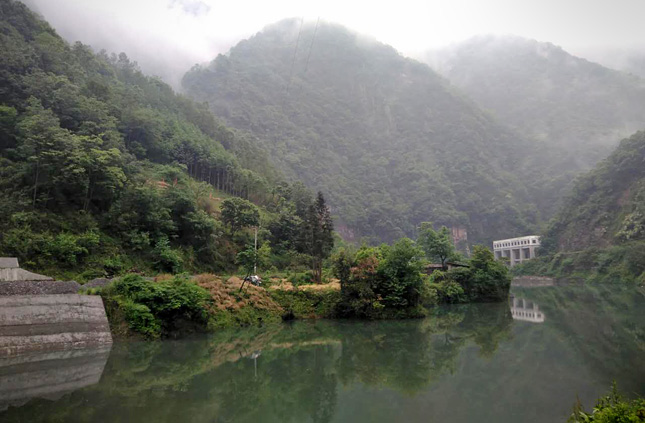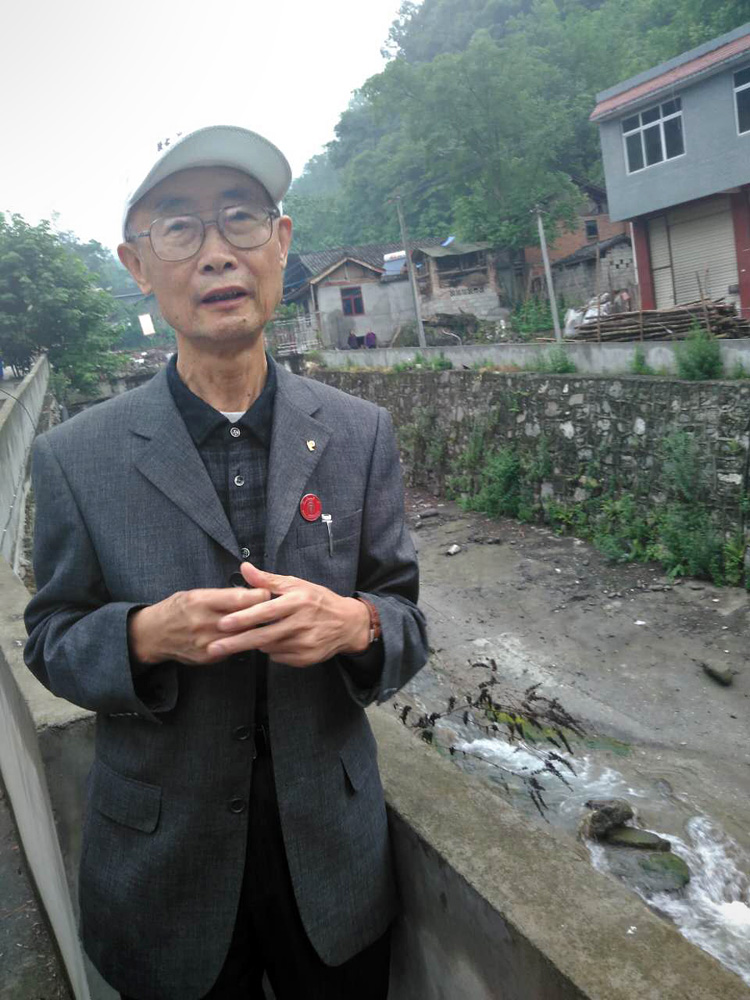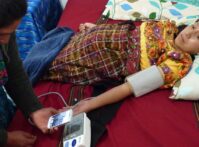-
Student Activists Push Back Against Rising Tide of Municipal Waste in Rural China
October 18, 2016 By Lucy Binfield
Nestled in the mountains of western Sichuan Province sits the town of Piankou. Surrounded by three nature reserves that contain several hundred giant pandas, the landscape is undeniably beautiful. Rivers crash their way through rocky valleys framed by bamboo covered hills. But the scene was not always so tranquil.
Until a recent project by the Shangri-La Institute and Swarovski Waterschool, water channels running into the Baicao River passing through Piankou were frequently clogged with trash. “At that time, there was no garbage collection at all,” said Fu Zhiping, a professor of ecology at Mianying Normal University, during a recent visit. “It was a river of garbage up to here!” he explained as he pointed above his waist.
The Baicao is a tributary to the Yangtze River, China’s longest and perhaps most important river and the single largest source of pollution flowing into the Pacific Ocean. The Yangtze Basin produces 70 percent of the nation’s rice, 70 percent of its freshwater fish, 40 percent of the country’s GDP – and soaks up 60 percent of the country’s industrial pollution.
A symptom of consumerism outpacing municipal waste management, Piankou’s woes are not unique in China. While central government policies have focused on mitigating the nation’s urban waste problems, rural waste management continues to be overlooked. At the time of the Waterschool and Shangri-La program, no less than three different ministries mandated regulations and procedures on various types of waste management, but none had formal plans regarding rural waste.
Urban waste management has been the focus, while rural areas are overlookedAs a result, countryside communities were reliant on natural landfills, risking serious health, food, and water issues. The lack of rural infrastructure will continue to damage the vibrant and sensitive ecosystem of the Yangtze unless a comprehensive overhaul of rural waste management is achieved. But where national efforts have faltered, local grassroots projects have found some success.
In 2008, a devastating earthquake struck Sichuan, damaging many communities, including Piankou. The Shangri-La Institute, a Chinese environmental NGO that promotes sustainable development through education, collaborated with the Swarovski Waterschool, a water education and sanitation project network that works in thousands of schools around the world, to launch clean-up projects in more than 100 towns. The Shangri-La Institute hoped to aid in immediate recovery efforts. However in Piankou, they also noted the Baicao’s clogged waterways.
The two organizations found willing partners in local elementary school students who were eager to clean up the town’s foul smelling river. Students tested pollution levels and discovered the river’s water quality was poor enough to be unfit for direct human contact. Following this discovery, the program expanded, launching an environmental education campaign targeting waste management reform.
Access to consumer goods in rural areas of China has increased dramatically in the last few years, but trash collection is uncommon. Few rural governments have the funds necessary to set up robust waste management systems, and ignorance about waste management is widespread. Many people simply don’t understand that plastic packaging and containers are harmful to the environment and aren’t accustomed to putting their waste in designated containers.
 In Piankou, students began a public education campaign with the support of the Waterschool and Shangri-La Institute. The community responded with earnest support. When polled by the schoolchildren, a large majority of locals believed the campaign to clean up the river and solve the town’s waste problems was necessary. The dissemination of information by the children was the foundation for a collaborative partnership with the community, and consequently, the foundation of the project’s longevity.
In Piankou, students began a public education campaign with the support of the Waterschool and Shangri-La Institute. The community responded with earnest support. When polled by the schoolchildren, a large majority of locals believed the campaign to clean up the river and solve the town’s waste problems was necessary. The dissemination of information by the children was the foundation for a collaborative partnership with the community, and consequently, the foundation of the project’s longevity.Eight years later, the program is still going strong. I visited this year to see its impact. As we strolled through Piankou guided by Fu Zhiping, the program’s local coordinator, we saw the channels running down to the Baicao River were largely garbage free. The children had accomplished an incredible amount.
The most important change was the design and implementation of a new township-wide garbage disposal system. Complete with a pick-up schedule, paid employees, and new strategically located trash cans, the system appears sustainable. The children’s enthusiasm and the effectiveness of the system led to funding from the town’s businesspeople to put in place and maintain the new system. The local government kicks in recycling bins and no-litter signage around the river. Fu explained that locals are also paid to regularly pick out trash from the river and monitor contaminants.
Clearly, there has been a major sea change here. What was once an apathetic community is now empowered, educated, and action oriented. Fu attributes the success to the Waterschool and Shangri-La project that helped bridge the gap between education, action, and tangible results. Students, he stressed, were the key to the transition we saw.
Inspired by Piankou’s grassroots success, other townships and villages along the Baicao River are using the same model to tackle environmental issues – a model that holistically unites multiple community roles for tangible change. Such an awakening among rural communities, and especially amongst young people, is crucial to turning back the wider tide of environmental degradation and loss of culture and traditions in rural China.
Lucy Binfield is the communications coordinator at the Shangri-La Institute for Sustainable Communities based in Beijing, China.
Sources: Caixin Online, United Nations Educational, Scientific, and Cultural Organization, WWF, Xinhua.
Photo Credit: The Baicao River and local coordinator Fu Zhiping, used with permission courtesy of Lucy Binfield.
 A Publication of the Stimson Center.
A Publication of the Stimson Center.







